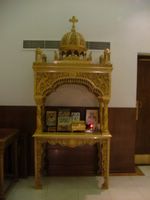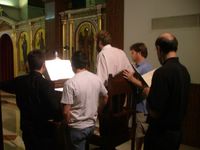Presvytera Meetings (2)
Tonight we talked about the reliquary.

This is the kouvouklion (tomb) which during the year holds the relics.
To venerate relics, you do the same that you would do when greeting a priest: make a small prostration (bend to touch the ground, or towards it), come forward to kiss (the priest's hand, or the relic box) and ask a blessing. We talked about the different ways priests bless. In Russia, you stand and they bless you with the sign of the Cross in front of your face. In Greece, you hold out your hands and they trace the sign of the Cross into your palms. Some priests will not let you kiss their hands unless you make it clear that you want a blessing, not just to kiss their hands. Fr. E— talked about how some women wear lipstick, and after kissing his hand it gets on there, and from there to the inside of his vestment when he pulls his hand out of the sleeve.
We touched on what it means to be called "Presbytera" as your name, and how that is your identity in the community. Fr. E— said that the people who want to call you only by your first name are often those who will not kiss your husband's hand. We talked about having a life outside the parish community where people will not call you "Presbytera."
Then we talked about the Liturgy and the Bible, and how the latter is present in the former. Spiral-bound books had been produced from somewhere, and they had about six or eight verses from the Bible (Old and New Testaments) for each little thing in the Liturgy. We went through the priest's initial "Blessed be God ..." and two petitions. The first petition talked about "peace from above" and the second about "peace to the whole world." Fr. E— said, "Without peace in our hearts, there is no Liturgy—it's just a beautiful opera." For next week, we are to bring the name(s) of those for whom we would especially like to have commemorated. I already know mine are my niece and nephew M and B, and my father Theodore.
After the presvytera meeting, there was chant practice for Peterbird's chant group.
Next week we're up. After the chant practice, I stole Peterbird to practice Fr. Seraphim's setting of Psalm 102, as I can't find that online. (There is a version (PDF) by the monks of St. Anthony's Monastery in Arizona.) We had a copy on Sunday, but gave it to the brother of a visiting deacon.
Three hours at chapel tonight. I'll try to post more (with pictures) about the reliquarytomorrow later.

This is the kouvouklion (tomb) which during the year holds the relics.
To venerate relics, you do the same that you would do when greeting a priest: make a small prostration (bend to touch the ground, or towards it), come forward to kiss (the priest's hand, or the relic box) and ask a blessing. We talked about the different ways priests bless. In Russia, you stand and they bless you with the sign of the Cross in front of your face. In Greece, you hold out your hands and they trace the sign of the Cross into your palms. Some priests will not let you kiss their hands unless you make it clear that you want a blessing, not just to kiss their hands. Fr. E— talked about how some women wear lipstick, and after kissing his hand it gets on there, and from there to the inside of his vestment when he pulls his hand out of the sleeve.
We touched on what it means to be called "Presbytera" as your name, and how that is your identity in the community. Fr. E— said that the people who want to call you only by your first name are often those who will not kiss your husband's hand. We talked about having a life outside the parish community where people will not call you "Presbytera."
Then we talked about the Liturgy and the Bible, and how the latter is present in the former. Spiral-bound books had been produced from somewhere, and they had about six or eight verses from the Bible (Old and New Testaments) for each little thing in the Liturgy. We went through the priest's initial "Blessed be God ..." and two petitions. The first petition talked about "peace from above" and the second about "peace to the whole world." Fr. E— said, "Without peace in our hearts, there is no Liturgy—it's just a beautiful opera." For next week, we are to bring the name(s) of those for whom we would especially like to have commemorated. I already know mine are my niece and nephew M and B, and my father Theodore.
After the presvytera meeting, there was chant practice for Peterbird's chant group.
 Chant Group IB. |  Chant Group IB from the back. |
Next week we're up. After the chant practice, I stole Peterbird to practice Fr. Seraphim's setting of Psalm 102, as I can't find that online. (There is a version (PDF) by the monks of St. Anthony's Monastery in Arizona.) We had a copy on Sunday, but gave it to the brother of a visiting deacon.
Three hours at chapel tonight. I'll try to post more (with pictures) about the reliquary



4 Comments:
Hi, I enjoy reading your post and I really like the photos too! Take Care, Joanna
Very interesting.
We have a newly ordained priest and I sometimes slip and forget to call his wife Matushka, I don't mean any disrespect, though, it's just been a long time of knowing her as just Firstname
Just curious...
Was the word originally spelled "Presvytera" and always pronounced "Presbytera" and thus the spelling was altered over time? Or did that happen when the word was written English and is still spelled with a "v" in Greek?
What is the difference between Matushka and Presvytera.
Is it disrepectful not to kiss a priest's hand? You say that some priests will not let you kiss their hand unless you are asking for a blessing--as if kissing the hand is a priviledge or perhaps an unneccessary formality, but you also say that those people who will call the priest's wife by her first name will also refuse to kiss his hand--as if the kiss is a sign of respect and is expected from everyone. I'm just curious, since I'm not familiar with the custom.
My answers to Lissa's questions.
The presb/vytera. In Greek it was always spelled with a beta. In modern Greek (and definitely at least as far back as the New Testament times) that is pronounced as 'v'.
However, since it is a 'beta' it may simply have been transliterated as a 'b' in English. That's as much as I can figure out - if someone else knows better, please let me know.
For kissing the priest's hand, there are two schools of thought (that I know of), so to speak and they are not necessarily mutually exclusive. One reason to kiss the priest's hand is that it is the hand that handles the Body and Blood of Christ. The other is that it is customary in the Orthodox Church to ask the priest/bishop for a blessing and to respond to that blessing by kissing the priest/bishop's hand. A number of priests feel that they are unworthy of having their hands kissed (I can definitely understand their position) unless it is in response to a blessing. In any case, you 'kiss the hand that blesses you.'
Finally, Matushka = Russian, Presvytera = Greek - priest's wife.
Post a Comment
<< Home